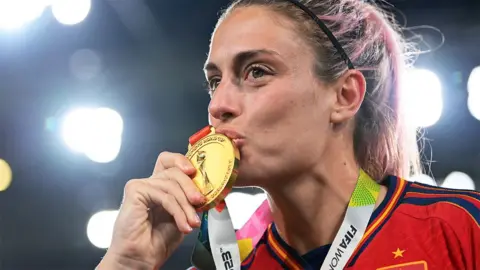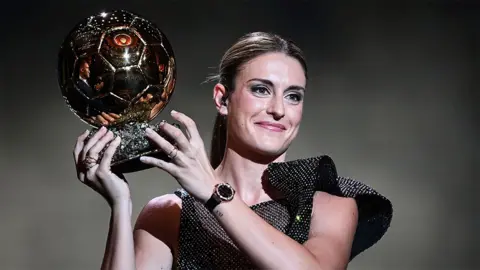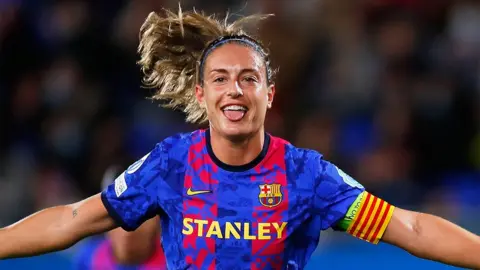 Getty Images
Getty ImagesSpanish football is on top of the world right now.
Last year its women’s squad won the World Cup in a nail-biting final against England.
But, as Alexia Putellas is quick to point out when she speaks to BBC Newsbeat, they’re not the only ones packing silverware.
The country’s female under-17s and under-20s teams are also the current world champions.
Oh, and the men’s team won the Euros a few weeks ago, too.
Now Putellas, a two-time winner of football’s prestigious Ballon D’or, is setting her sights on another prize.
The Barcelona captain will soon be kicking off Spain’s campaign for Olympic gold.
Male competitors over 24 years old are unable to represent their countries at the sporting extravaganza, but there’s no age limit for women.
Putellas, speaking after training for the Games in Paris, admits she’s “so tired” from the post-season session.
And while she’s keen to cap a remarkable run of football success for Spain, she says the Olympics “is so different” to other tournaments.
“It’s like magic,” says Putellas.
“There will be the best athletes from every sport around the world. So it’s incredible to be part of.”
But you can never have too many medals.
“We don’t just want to go – we want to compete and, of course, win,” Putellas says.
The midfielder has got some experience of winning – she’s helped her club Barcelona to win eight league titles and three Champions Leagues.
She was also a member of Spain’s World Cup-winning squad, and is the country’s leading goalscorer and most-capped female player.
“You have to work every day, training,” she says.
“If you are in love with this, you work hard. And then I think good things will happen.”
 Getty Images
Getty ImagesA large part of her success, she says, is also down to the resource her club Barcelona has put into its women’s team.
“I feel like I’m privileged. Because I go to the club every morning, and I have everything to work hard,” she says.
“All the facilities, the best coach, the best staff.
“And for me I feel bad, because I know that’s not the reality for all players.”
In England, there have been concerns over the resources being put into the women’s game.
Some teams have faced financial difficulties, even as revenues rise more widely.
“I hope that everybody takes the women’s game as seriously as Barcelona,” Putellas says.
“Everybody’s asking you for a photo or cheering you, it’s so magical, that environment.”
Putellas has previously spoken about institutions needing to show “courage and leadership” to stop women suffering a “lack of respect or abuse”.
Her team-mate Jenni Hermoso was kissed without consent by former Spanish football president Luis Rubiales.
He is now facing charges of sexual assault and coercion, which he denies.
Putellas feels authorities can do more to support the women’s game.
“We are working and I think it’s going better than before,” she says.
“But it’s never enough.”
She says she feels a responsibility to use her platform to further the cause of women in sport.
“As a person, I’m quiet. I love to be with my family and friends,” she says.
“But also I have a lot of interest related with the sport, not just for being a footballer, for example, being an ambassador and a mentor.”
 Getty Images
Getty ImagesDuring her career, Putellas has suffered setbacks and injuries, but bounced back.
She advises other young players to not lose hope in tough moments.
“I feel that sometimes the player has to do things that aren’t our job,” she says.
“Sometimes our power has to be in the field.
“But maybe you have another opportunity in another club. Try to work hard, be positive.”
Ultimately, for Putellas it’s the love of the game that always powers through.
“Why is football so special? Because I think it’s the best thing I do, I’ve been practicing football since I was six,” she says.
“I love the way you connect with your teammates inside the field… if you connect with one teammate and pass, pass, pass.
“And the moment you score – it’s a feeling that produces happiness,” she says.


